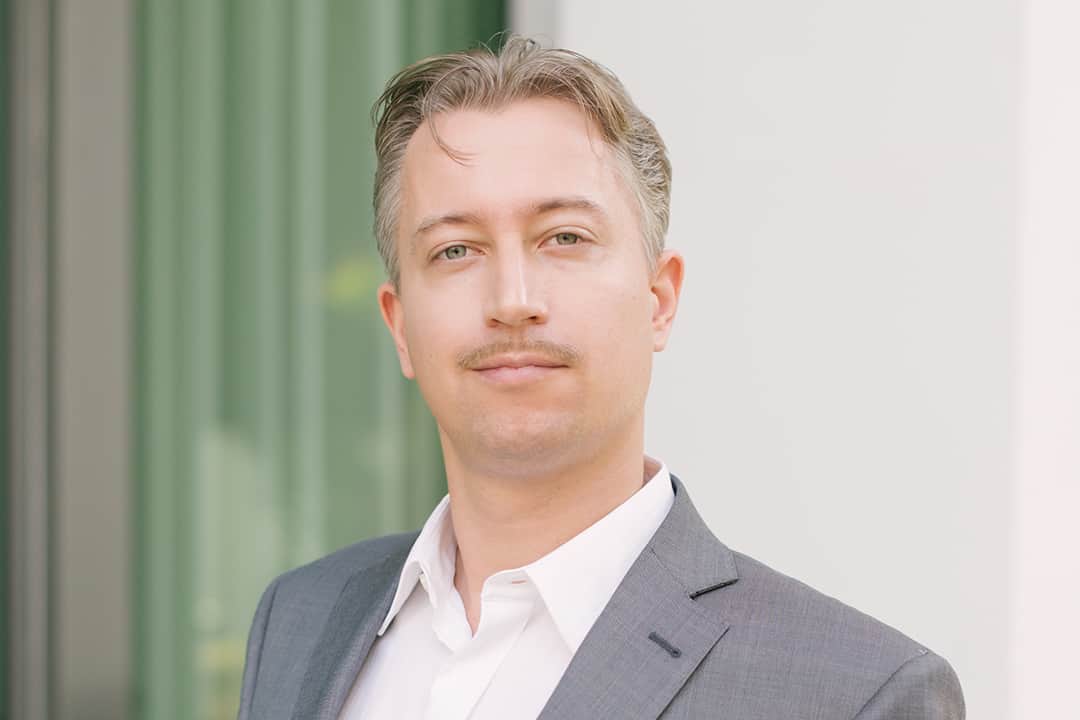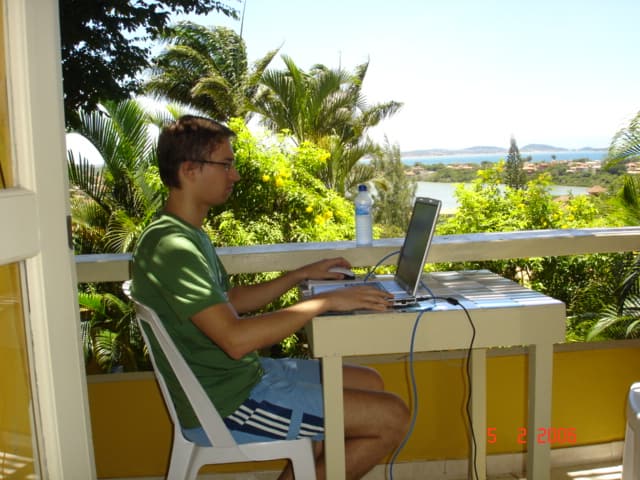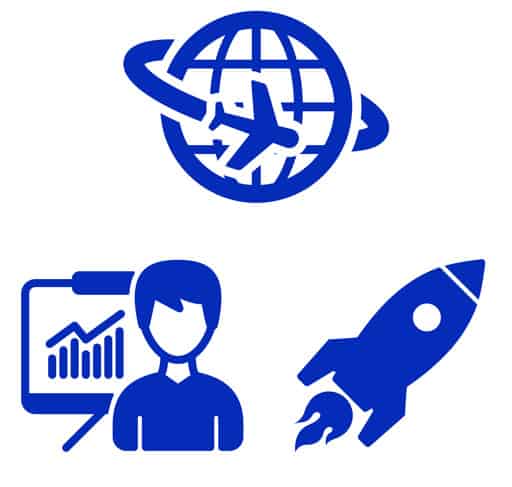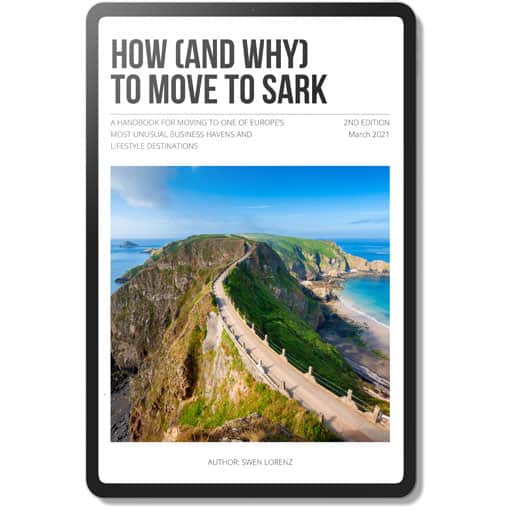About this interview series: Every month, I am posing 10 questions to someone who has managed to build the kind of life that my readers aspire to. Broadly, this usually includes working outside of conventional corporate employment, enjoying a larger amount of freedom to pursue interests and passions, and being good at figuring out future trends before others recognise them. Most of these people are hidden stars, i.e. you’re unlikely to read about them in the mainstream media. I am choosing them based on what they have achieved, as well as their ability to inspire and motivate you into action!
Today’s interviewee Marco Wutzer was born in Germany but left the country at age 24 and has since been based out of several South American countries. He has built several online businesses, participated in the cryptocurrency movement long before anyone had even heard of it, and has travelled to over 70 countries. I picked his brain on how anyone can create a life that is similar to his, why it’s more urgent than ever to have an international perspective, and what opportunities he sees for aspiring entrepreneurs in the years to come.

1: You became a “Digital Nomad” well before that term even entered the common use, and you decided to spend the majority of your time in South America. Give us some insights into what led you to these decisions, how your first steps in that direction played out, and whether or not it is easy for others to lead their life in a similar way.
Back in 2005 I realised that the European Union would not end well. The idea of a common market where goods and people can move freely has slowly turned into over-regulation and decreasing personal liberties. A one-size-fits-all approach for an area as large and culturally, economically and financially diverse as Europe is just a terrible idea. I was also not keen on paying any income taxes, especially in Germany where they are ridiculously high.
This was just a couple of years after the dotcom bust but I had already built a successful online business. In other words, I was location independent. That’s why I became an expert in “jurisdictional arbitrage” and started to diversify my business, personal life and assets.
Jurisdictional arbitrage means taking advantage of the fact that countries compete with each other. Different countries offer different conditions as it relates to doing business, banking, taxes, residence, climate and lifestyle.
So I got rid of my apartment in Germany and quickly moved to Asunción, Paraguay. Paraguay has no personal income tax, the weather is much more pleasant if you like warm climates, it is very cheap and I quickly got used to the slower paced lifestyle.
Since then I have lived in many other countries and travelled to even more. The important thing to realise is this:
In 2005 it blew people’s mind when you told them you earn money online. Most hotels at the time didn’t even have Wifi! I remember spending some time in Búzios, Brazil, by the beach and the hotel had to string 30m of network cable up to my balcony so I could work.

Búzios 2006: Pre-wifi times. Notice the blue network cable…
Today all of this has become much easier. You can go online everywhere. It is much more accepted to work remotely, and starting an online business is easier than ever before.
Thanks to the sharing economy with the likes of AirBnb it has also become much easier to move abroad even if it’s just for a few months.
You are not a tree that has roots in the ground. Where you live right now is pretty much an accident of birth. The world is your oyster. There are lots of adventures and opportunities waiting for those who dare to travel and explore.
2: Not only have you been to over 70 countries, you also once specifically travelled to 20 countries to evaluate them as possible bases from where to operate. That’s what I’d call thorough, on-the-ground research! Was this process worthwhile, and what would you do differently if you had to do such an investigation again? Last but not least, I am dying to know which country came out on top and what were the two runners-up?
I always find exploring new places worthwhile. There is no replacement for first-hand experience. Only if you have been somewhere yourself, can you really know what you’re talking about. And even if you end up not liking a place you gain new insights and might make valuable new contacts.
To investigate all 20 candidates on my list took five years. Initially I thought I’d need two years but once you add a little safari here and little island trip there… time passes quickly when you’re having fun! And the path was just as important as the destination. I wouldn’t do anything differently.
You are not a tree that has roots in the ground. Where you live right now is pretty much an accident of birth. The world is your oyster.
So what is the best place in the world to live? I’m sorry to say there is no Shangri-La. Every place has its advantages and drawbacks. The best place for me might be a place you don’t like at all. It comes down to personal preference.
My main base now is Medellín, Colombia. The local “paisas” are very friendly people, the eternal spring climate is great, it’s a superb value, the food scene is excellent, the demographics are young, there is constant progress and it’s getting more cosmopolitan all the time. Plus, as a European (or American), it’s very easy to fit in in South America.
But as much as I love Medellín, I only spend six months a year there. There are just too many exciting places and interesting things happening all over the globe. I can’t afford to be tied down to just one single place.
Another city that I really like and where I had lived before is Buenos Aires, Argentina. If Western Europe continues its current trajectory it will probably become the most European place in the world in the next decade.
Capetown, South Africa, is another favourite. However, South Africa has too many problems for my taste to have a more permanent presence there, e.g. very high crime rates, open racism and a totally corrupt political system.
When it comes to beaches it’s hard to beat Brazil. I’m also a big fan of Bali in Indonesia, and the Philippines has a lot to offer for the serious beachcomber.
3: On a day-to-day basis of living your life and running your business, are you encountering any particular regular problems? And how do you deal with them? Surely “the system” wasn’t created for people like you to exist, so there must be plenty of hiccups all along the way?
As a perpetual tourist and prior taxpayer I exist outside of “the system”.
This comes with many benefits. 99% of the bureaucracy issues don’t even come up in the first place because everywhere I’m being treated as valuable tourist. When you just transit from place to place nobody is really interested in you.
There are some minor practical issues when it comes to renewing passports, submitting utility bills to open bank or brokerage accounts and so on but they are just minor inconveniences. The whole point is to avoid “the system” as much as possible.
Most governments extort as much cash and resources from their citizens as possible and generally make life difficult. Bureaucracy and regulations have spun completely out of control in most places.
Once you become an international man and pick and choose only the best of what different countries have to offer your quality of life improves dramatically.
4: You probably didn’t even know this, but it was through a mutual friend that I first laid my hand on Bitcoin when it was at $29 back in 2012, and he in turn had been pointed towards the opportunity by you! You were running a crypto-mining operation in Buenos Aires well before the wider public had heard of Bitcoin, and now you are writing a newsletter that is at the forefront of investing in cryptocurrencies, blockchain, and decentralised networks. With your insights into the sector and the wider world, and leaving the Bitcoin subject aside, what do you think could be one of the next truly big, but as of yet un-anticipated trends in the blockchain and decentralised network industry?
Most people are completely unaware that we are in the very early stages of a paradigm shift in the financial markets and many other sectors of the global economy.
The emerging Blockchain Ecosystem is creating a supra-national infrastructure that lets people deal with each other directly peer-to-peer.
Once you become an international man and pick and choose only the best of what different countries have to offer your quality of life improves dramatically.
This decentralised, global network completely cuts out middle men such as banks, lawyers, notaries and even governments.
Blockchain technology creates a trustless environment where transactions are guaranteed and immutable. Nobody can censor you and interfere with your business.
The Blockchain Ecosystem will improve many areas of our lives. Cryptocurrencies such as Bitcoin are just the first, most obvious application of this new technology.
5: That is a weighty prediction to make. Can you give me a few concrete, current examples of where we can already see the world heading in that direction?
There is a lot of manipulation and censorship happening in social media. Facebook, Twitter and YouTube are all examples of heavily censored platforms. New decentralised networks that are immune to censorship and where users own their own data will eventually replace them.
Global supply chains move trillions of dollars worth of goods. They have many middle men and come with lots of paperwork.
Gaming, gambling, self-sovereign identity, remittances, the Internet of Things, lending, online advertising, data marketplaces, the sharing economy and countless other sectors are all ripe for disruption by the Blockchain Ecosystem.
I think self-sovereign identity is one of the killer applications of blockchain technology. There are hundreds of millions of people in the developing world that have no form of identification. That means they can’t get a bank account and a multitude of other essential services, let alone travel.
Self-sovereign identity means the individual as opposed to a government can securely prove their own identity while simultaneously retaining control over their own data.
We are still at the very beginning of the Blockchain Ecosystem. It’s taken the Internet 30 years to go mainstream. Blockchain technology is barely ten years old. The next five to ten years will see massive growth and adoption.
6: If someone wanted to position themselves as entrepreneur or sovereign man to be ready and prepared for this trend, what would be your advice to them?
I recommend to get familiar with cryptocurrencies. They will become more and more important as time goes on.
Download a wallet like Exodus and buy a small amount of Bitcoin through an exchange like Bitstamp.
Self-sovereign identity means the individual as opposed to a government can securely prove their own identity while simultaneously retaining control over their own data.
There are well over 200 countries (and 327 significant destinations according to the Travelers’ Century Club). Instead of your typical holiday go and explore a new place. Venture off the beaten path. Travelling will expand your horizons and bring new opportunities.
7: What you are predicting about blockchain and its ability to disrupt politics, could have profound effects on the ability of governments to continue operating the way they do. No doubt many countries will resist such changes, others will embrace them. We know which obvious ones are likely to resist. Do you see any likely candidates for countries that are already (or will soon be) embracing these changes?
Socialism worldwide (the Western “welfare state”) with its trillions of dollars in unfunded liabilities is already in the early stages of collapse.
Once a significant part of global assets moves onto blockchains and blockchain transactions become completely private, governments around the world will lose their ability to tax income and assets. Their power and their ability to control will be greatly diminished.
On the other hand, blockchains can eliminate fraud in voting and government spending so they can also become a tool for fighting political corruption.
Small, nimble countries that are forward-looking can see the writing on the wall. They are aiming to become hubs for blockchain technology and work on attracting talent and capital. We are talking about the usual suspects: Singapore, the UAE, Bermuda, Gibraltar, the Baltics, Switzerland, Liechtenstein, Malta and so on.
More reactive and restrictive countries are trying to regulate what they don’t understand. They will simply fall back economically and become less important.
Talent, technology and assets are increasingly mobile and move to where they are treated best.
One thing is for sure: Lots of things are going to change dramatically over the next ten years. If you understand where things are going and position yourself accordingly you can profit in many ways.
8: Will the “resisters” have a chance to succeed? Looking at the world map, it seems particularly likely that debt-laden Western Europe and the US/Canada will try to prevent its taxpayers from opting out. Also, we have China setting an example for locking its citizens into a digital social-control system. Will these efforts succeed and how can an individual who lives in this geographic area deal with this issue?
I predict a complete breakdown of current structures. If you look at history you can see that the status quo doesn’t quietly give way.
The breakdown of the current constipated, high-tax, over-regulated nation states is great news. It will unleash entrepreneurial and creative forces at a grassroots level that will lead to a second Renaissance in the late 2020s.
The effects will be so profound that it’s difficult to predict the full extent of this change. We’re at the end of an era and the Blockchain Ecosystem will help to usher in a new world. What an exciting time to be alive and participate in this monumental shift!
9: Assuming this new era does take shape as predicted by you, no doubt we all will need to learn new skills and adapt to new ways of working, living and running businesses. Do you have any advice for readers who want to develop skill sets to that end? Where should they start, what should they read, which areas are particularly worthwhile?
If we are moving into a second Renaissance it pays to become a Renaissance man (or woman) and have a broad education. It should go without saying that one should never stop learning.
Many decades ago Alvin Toffler already wrote about the concept of “future shock”. We have to deal with ever increasing transience and novelty. Technology is compounding upon itself and the pace of change is increasing. Those who keep learning and can process new information quickly are best equipped to manage and benefit from all this change.
The breakdown of the current constipated, high-tax, over-regulated nation states is great news. It will unleash entrepreneurial and creative forces at a grassroots level that will lead to a second Renaissance in the late 2020s.
And for Millennials and Generation Z I think one of the smartest things you can do is learn to code. Not only are there many high-paying programming jobs available but you can also actively participate in shaping the future.
Data has already taken over from oil as the most important resource in the world.
10: Last but not least, let us into some of the favourite things you love doing in your chosen home-base or while you are travelling!
Two of the great benefits that come with travelling are trying new, exotic food and meeting people from different cultures. I’m a fan of surreal and abstract art so I also like visiting art galleries.
At home in Medellín, other than catching up with friends and enjoying Medellín’s excellent culinary scene, I try to spend as much time at home as possible to enjoy my vast library and music collection.
Connect with Marco on LinkedIn
If you enjoyed this, you might also find the following articles useful:
Want to print this article? Open a printer friendly version.
Did you find this article useful and enjoyable? If you want to read my next articles right when they come out, please sign up to my email list.
Share this post:


